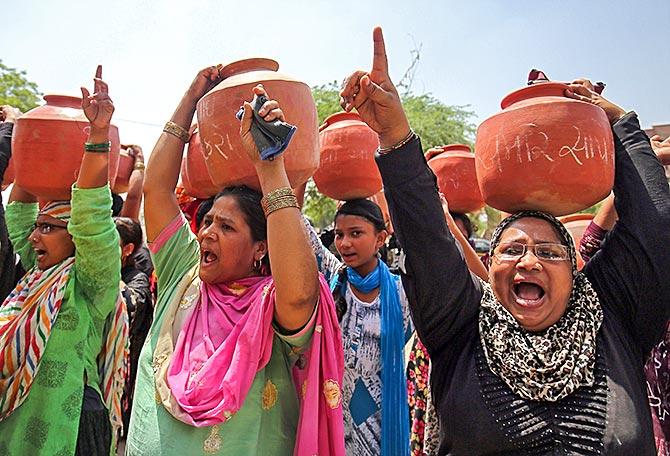The only way water will be used efficiently by consumers is if they have to pay an appropriate price for it, just like they do for any other (private) good they consume, says Dhiraj Nayyar.

It is just as well that water is going to be a key priority for Prime Minister Modi in his second term.
The new Jal Shakti ministry, an amalgamation of the ministry of water resources and the department of drinking water and sanitation, was the first indicator of a new focus.
That Modi’s first Mann ki Baat in his second term was dominated by the theme of water conservation has only reinforced the seriousness of the issue.
Of course, clean drinking water -- its absence actually -- has been a well identified priority for long. What is new is the prospect of a complete dwindling of overall water supply even in major metros like Chennai.
Is India short of water? No, but there may be regional variations.
Does India manage its water resources well? Emphatically no.
One way to better manage water resources is through conservation methods like water harvesting. Modi wants this to become a mass movement. One can only hope it does.
But there is another way to ensure efficient water management. It’s also the elephant in the room. Market pricing for water.
Unlike air, water is not quite a public good. Economists require a good to be non-rival and non-excludable in consumption for it to be a public good but water is rival (because consumption by one individual reduces its availability for others) and it is excludable (because supply can be cut off if you don’t pay).
The only way water will be used efficiently by consumers is if they have to pay an appropriate price for it, just like they do for any other (private) good they consume.
The consequences of not charging the right price for water are serious.
There is no reason that the rainfall-deficit (and water deficit) regions of Maharashtra should produce sugarcane which uses around 2,500 litres of water for every kilogramme of output.
But since farmers are not charged market prices for water, they indulge in farming inappropriate crops.
Similarly, in the states of Punjab and Haryana where farmers get highly subsidised or free water, highly water-intensive rice cultivation has led to desertification.
Crops like sugarcane and rice should only be grown in water surplus regions but populist “free water” policies have achieved the opposite.
Apart from farmers, even industry and individual consumers need to be charged an appropriate price to ensure best use.
In industry, incentives/penalties can be given for water recycling/reuse.
The simple point is that consumers are more likely to respond to price signals/incentives/ disincentives than appeals for voluntary conservation.
The obvious objection to market pricing of water is that it will hurt the poor. The reality is that the poor are disproportionately hurt by water shortages.
In urban areas, the middle class and rich are able to organise alternative supplies of water by paying a premium, usually to tanker mafias. These mafias are a creation of an inability to price water appropriately -- remarkably most claim to be supplying water from the reservoirs of the local Jal Board.
Essentially, a parallel economy which prices water at a premium is running to the detriment of the poor.
Instead, the government should allow market prices for water and give upfront subsidies to poor consumers through direct benefit transfer.
Admittedly, there is a real challenge in implementing water pricing in the absence of robust institutional structures.
For a start, water is a state subject so the Union government is not in a position to impose pricing across the board.
Within states, there is a need for water regulators -- a proposal which has been around for a number of years but which has not been implemented barring a couple of states because of a reluctance to move to a market-based pricing regime for water.
Since the supply of water (particularly in cities) is often done by a single supplier (most often state owned but could potentially be private), there is need for a regulatory authority to ensure that there is no monopolistic pricing.
Also, if the regulatory authority is independent and operates at an arms-length from the government, presumably it can resist political pressures while determining/upholding the right price for water.
Unfortunately, the experience from electricity regulators in states is not encouraging. The reason for the miserable state of discoms is at least partly attributable to electricity regulators not stamping their authority. However, that is not an argument to do away with regulators. They must be given teeth.
Obviously, elected governments would be tempted to supply water (and indeed electricity) at subsidised rates to various constituents.
It is a government’s right to subsidise, but it must not do so by distorting the market, but through direct benefit transfers to a targeted set.
The alternative is a highly water scarce (and indeed energy scarce) economy.
Dhiraj Nayyar is chief economist, Vedanta Ltd.











